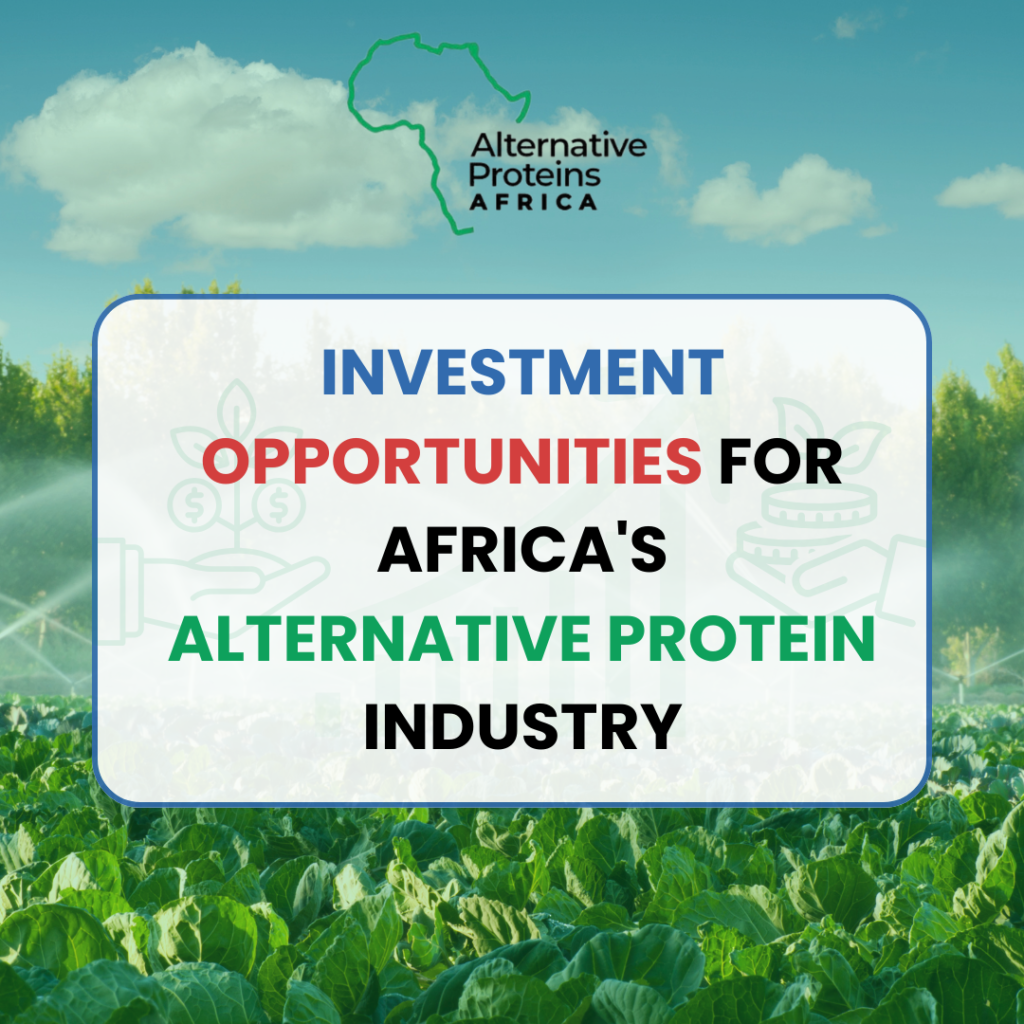
Introduction
There is an increased demand for protein globally, driven by the soaring population and the shift in dietary preferences. With the numerous challenges conventional meat production poses on health and environmental sustainability, alternative proteins emerge as a viable replacement. Fortunately, the African alternative protein industry holds the transformative power to promote and advance sustainable and innovative food solutions, especially in protein production. It is, therefore, necessary to examine the investment opportunities available for the industry in Africa.
Where we are
The journey toward sustainable and ethical protein sourcing in Africa has begun. Some consumers are becoming aware of various global issues like food insecurity, depletion in environmental resources, climate change, and the contributing role animal agriculture plays. This level of awareness is thanks to the deliberate effort of different stakeholders, organizations, and projects like Alternative Proteins Africa.
Notwithstanding, the journey is still far ahead, especially when the African protein market is estimated at USD 2.12 billion in 2024 and is projected to reach USD 2.64 billion by 2029, with just about 4.48% Common Annual Growth Rate (CAGR). Due to a high poverty rate, a larger percentage of the African population finds it difficult to meet their daily calorie requirement. This has made conversations around sustainability not gain the needed priority.
But generally, plant-based proteins are increasingly becoming popular on the continent. Interestingly, Kenya and Nigeria were among the top 10 countries worldwide that experienced growth in vegetarian populations between 2016 and 2017. However, the demand for animal protein is likewise increasing, with an average Ethiopian consumer estimated to spend 18-20% of their consumption expenditures on animal-sourced foods. Little wonder, animal feed uses about 50% of plant proteins produced.
As we have over time emphasized, with supporting evidence, such an increase in animal agriculture presents significant challenges to our existence and sustainability. As a result, scholars have predicted an increase in the dependence on plant-based food. Therefore, Africa must give enough consideration and attention to investment opportunities in alternative proteins.
Where to look: Investment Opportunities for Africa’s alternative protein industry
The continent can play a vital role in the global food system arena. The great potential present in Africa makes it pivotal in enhancing the alternative protein industry. From the production of plant-based proteins (such as legumes, pulses, beans, and products like soya milk, tofu, plant-based meat, etc.) to fermentation-derived proteins and cultured meat, the alternative protein industry is set for tremendous growth within the continent. Already, we are taking significant actions and making progress, as major players are hitting the market.
However, achieving an established and flourishing alternative protein industry requires deliberate actions directed at profitable investment. This is of great importance in addressing various concerns, such as the accessibility and affordability of protein-rich foods. Below are some of the areas we must pay attention to in order to pave the way for a prosperous future in sustainable protein production.
Investing in raw material production
On the global level, the availability of raw materials and ingredients, especially for early-stage start-ups in the industry, is a significant limitation. But this challenge presents a major opportunity where Africa should direct its investment efforts in the alternative protein industry. The continent boasts a high portion of uncultivated agricultural land and untapped water resources that we can harness to our advantage.
These resources are essential to producing protein-rich crops that could be used as raw materials. Such an investment will go a long way in reducing production costs and, ultimately, the market prices of these products. It will likewise position the continent as a major exporter of raw materials, thus boosting regional economies.
Investing in research and development (R&D)
Furthermore, the need for continued investment in research and development can never be overemphasized. The success of the industry in Africa depends on innovation and the development of products that better align with the preferences of local consumers. Through R&D, we will be able to achieve price parity and improvement in texture and taste. As it stands, meat substitutes and alternatives must be able to compete with traditional meat in terms of prices, texture, nutrition, and taste.
Investing in human capital
As a result of the low level of skilled workforce to drive initiatives in research and development, investing in human capital and resources will in no small way contribute to the industry’s growth. Human resources are an essential driver of innovation in any sector. The scaling of the different types of alternative proteins is also dependent on the development of a robust workforce.
Encouraging local investment
Local investors need to begin investing more in the African alternative protein industry. Agreeing with this, Hakeem Jimo, the co-founder of a plant-based restaurant in Nigeria, opined that local investors are not traditionally inclined to invest in plant-based food tech. However, for a robust increase in the alternative protein industry, where created products meet the culinary preferences of consumers, we need to rethink this trend and encourage local investments.
Attracting global investment
Attracting global capital is crucial to the industry’s growth on the continent. This inflow of resources can catalyze innovation, enhance efforts in research and development, build necessary infrastructures, expand distribution networks, promote the adoption of cutting-edge technologies, and facilitate the scaling of the industry. However, to attract such investment, we must create a friendly environment with a transparent regulatory system.
Conclusion
As we work towards sustainable protein production on the continent, we must embrace efforts that encourage the growth of the alternative protein industry. The industry is at a point where strategic investments can be the linchpin for transformative change. Navigating the funding landscape requires a collective effort from governments and private investors (both global and local). By unlocking the full potential of alternative proteins, Africa would be leading the way toward a resilient and sustainable future in the global food system.

